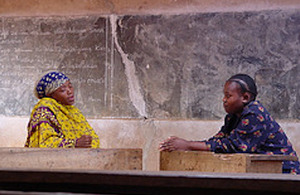DFID Research: Support to the Tanzanian government with adolescent sexual and reproductive health
Adolescents are encouraged to use reproductive health services through MEMA kwa Vijana, a sexual and reproductive health programme aimed at young people

HIV counselling. Picture: Mr Ush/Flickr
Nearly half of all new HIV infections are among young people aged 15 to 24. Adolescents are therefore a priority target group for HIV prevention. Making reproductive health services more youth-friendly, and encouraging their use, is a key means of HIV prevention. Supporting national governments and non-governmental organizations in designing and implementing evidence-based policies and interventions to achieve youth-friendly health services and promoting the use of these is vital.
MEMA kwa Vijana (MkV) is an adolescent sexual and reproductive health programme, working in schools, health facilities and communities in Mwanza Region, Tanzania. Its goal is to improve the sexual and reproductive health of adolescents, and it provides an excellent example of the kinds of interventions that are possible in this area.
MkV recently undertook an evaluation of health worker training, including comparison and revisions of the MkV and Tanzanian Ministry of Health & Social Welfare manuals, the Monitoring and Evaluation (M&E) toolkit, and the youth friendly standards of health facilities. This was deemed necessary because previous interventions had not been evaluated well and even fewer had their subsequent ‘roll-out’ carefully studied. MkV aimed to influence policy by using its research evidence to influence national policies, facilitate a favourable environment for the implementation of its findings into future policy, and apply lessons from MkV to improve the policy planning process.
This collaborative project also involved the Tanzanian National Institute for Medical Research, Liverpool School of Tropical Medicine, African Medical Research Foundation, and the Social and Public Health Sciences Unit of the Medical Research Council.
As a consequence of its findings the MkV team has contributed to the following policies and tools developed by the Tanzanian government:
- Standards for Adolescent Friendly Reproductive Health Services
- Standards for Peer Education
- Adolescent Sexual & Reproductive Health training manual
- Monitoring and Evaluation Toolkit (to assess whether adolescent reproductive health standards are achieved).
These policies and training documents now guide the delivery of adolescent-friendly reproductive health services in Tanzania.
The timing of this research was opportune, as it coincided with the roll out a new government intervention on adolescent sexual and reproductive health. This involved training regional and district trainers. MkV supplemented this by supporting and evaluating its roll out to the local district level and all health facilities in four districts of Mwanza Region.
“At first I thought that the many different family planning methods were for older women and men, but after the training in youth friendly services it was clear that they are even for young people, and we are supposed to provide them with this service if they need it,” said an MkV trained health worker.
429 health workers in 177 health facilities have been trained in the provision of youth-friendly services. Close collaboration between MkV with government and district level staff in the Mwanza Region has increased knowledge and built the capacity of adolescent sexual and reproductive healthcare provision. This work has a positive impact on all young people who come into contact with reproductive healthcare services in Tanzania, and illustrates the value of research-informed practice.
The DFID-funded Research Programme Consortium, Research and Capacity Building in Reproductive and Sexual Health and HIV/AIDS in Developing Countries has been involved in the evaluation of MEMA kwa Vijana.